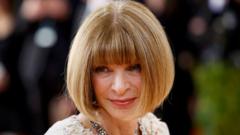Who Will Succeed Anna Wintour as Vogue's Iconic Editor?

The Legacy of Dame Anna Wintour: A New Era for Vogue
In the world of fashion, few figures have so profoundly shaped the landscape as Dame Anna Wintour. Since taking the helm of US Vogue in October 1988, Wintour has redefined what it means to be a fashion editor. From her groundbreaking first cover featuring Michaela Bercu to her recent announcement of stepping back from the editor-in-chief role after 37 years, Wintour's journey is marked by innovation, controversy, and an unyielding commitment to evolution in a rapidly changing industry. As we reflect on her tenure, it becomes evident that her influence extends far beyond the glossy pages of a magazine; she has become a cultural icon and a formidable force in shaping modern fashion.
Breaking the Mold: Wintour's Vision for Vogue
When Wintour assumed the role of editor-in-chief, Vogue was synonymous with opulence, featuring high-fashion models adorned with the finest jewelry in meticulously styled settings. However, Wintour's vision was different. She sought to democratize fashion and make it accessible to a broader audience. Her first cover, showcasing Bercu in a Christian Lacroix jacket and a casual pair of jeans, was a radical departure from tradition. It signaled the beginning of a new era—an era characterized by a blend of high fashion and everyday wear.
Defying Convention
Wintour's approach was not just about aesthetics; it marked a cultural shift. By placing a lesser-known model on the cover and incorporating everyday elements like jeans, she challenged the entrenched norms of the fashion industry. This was not merely a stylistic choice; it was a statement that fashion could be both aspirational and relatable.
Her willingness to break convention also extended to her choice of cover stars. In her first year, Wintour featured Madonna, marking the first time a celebrity graced the cover of Vogue. This decision was not without its critics, but it successfully bridged the gap between fashion and popular culture, solidifying Vogue's position as a leading voice in both domains.
Wintour's Enduring Influence on Pop Culture
Under Wintour’s leadership, Vogue evolved into a platform that showcased not only fashion but also the intersection of culture, politics, and celebrity. By embracing pop culture figures, she attracted a younger audience and established Vogue as a relevant and powerful entity within the broader cultural conversation.
The Celebrity Cover Phenomenon
Wintour's introduction of celebrity covers was a game-changer. The move brought a sense of familiarity and appeal to the magazine, inviting readers to engage with it on a personal level. Celebrities like Beyoncé, Rihanna, and even the Kardashians have graced the cover, further blurring the lines between fashion, fame, and cultural relevance. Wintour recognized that celebrity culture was not just a passing trend but a permanent fixture in the societal landscape.
Challenges and Controversies
While Wintour's reign has been marked by significant achievements, it has not been without its challenges. The fashion industry is often fraught with controversy, and Wintour has faced her share of criticism over the years.
Animal Rights and Cultural Sensitivity
In 1993, Wintour faced backlash from animal rights groups, most notably PETA, for her choice to wear fur. This incident sparked a heated debate about ethics in fashion, leading Wintour to eventually abandon fur entirely. Additionally, some of her editorial decisions, such as the infamous cover featuring LeBron James and Gisele Bündchen in 2008, drew accusations of perpetuating racial stereotypes.
These controversies underscore the complexities of Wintour's role as a fashion editor. Navigating public sentiment while maintaining the magazine's identity is a delicate balance, one that Wintour has managed to uphold throughout her career.
The Digital Transformation of Vogue
As technology advanced and social media platforms exploded in popularity, Wintour faced the daunting task of transitioning Vogue into the digital age. The rise of Instagram and other social media outlets transformed how fashion is consumed, leading to increased competition and changing reader expectations.
Adapting to a New Era
Wintour embraced digital innovation, recognizing the need for Vogue to remain relevant in a fast-paced media landscape. By expanding the magazine's digital presence and engaging with audiences through social media, she ensured that Vogue maintained its status as a leading authority in fashion. However, the challenge remains: how to balance the allure of celebrity content with the magazine's traditional focus on high fashion.
Wintour's Personal Brand: A Fashion Icon in Her Own Right
Dame Anna Wintour's impact extends beyond the pages of Vogue; she has become a symbol of the fashion industry itself. Her signature bobbed haircut and oversized sunglasses have made her an instantly recognizable figure, one who embodies the essence of high fashion. Wintour expertly navigates the delicate balance between being a public figure and maintaining an air of mystery, often saying that her glasses "help me see and they help me not see."
The Enigma of Anna Wintour
Despite her formidable reputation, Wintour has downplayed the focus on her image, asserting that her primary concern lies in the creative aspects of her job. However, her persona has contributed significantly to her legacy, making her a subject of fascination in both fashion and popular culture.
The Future of Vogue: Who Will Fill Wintour's Shoes?
With Dame Anna Wintour announcing her step back from the editor-in-chief role, many are speculating about who will succeed her. The landscape of fashion media is evolving, and the next editor will face unique challenges, from navigating the complexities of social media to addressing pressing issues like sustainability.
Potential Successors
Several names have emerged as potential candidates for Wintour's successor, including:
- Eva Chen: As the director of fashion partnerships for Instagram, Chen brings a wealth of digital expertise and a strong presence in the fashion community.
- Chioma Nnadi: A protégé of Wintour, Nnadi has spent the last two years heading up editorial content at British Vogue and is seen as a strong contender.
- Amy Astley: Former head of Teen Vogue, Astley continues to work for Condé Nast and could bring a fresh perspective to the role.
- Chloe Schama: Senior editor at Vogue, her experience in the industry positions her as a potential successor.
- Bee Shaffer Carrozzini: Wintour's daughter, she has a background in film production and could be a surprising choice for the role.
Regardless of who is chosen, the next editor will need to navigate the complexities of a changing media environment while remaining true to Vogue's legacy.
Conclusion: The End of an Era, but Not the End of Influence
Dame Anna Wintour's departure as editor-in-chief of Vogue marks the conclusion of a remarkable chapter in the history of fashion. Her legacy is evident in the magazine's evolution, the rise of celebrity culture, and the ongoing democratization of fashion. As we look to the future, one cannot help but wonder how the next generation of leaders will build upon Wintour's foundation. Will they continue to embrace the spirit of innovation and accessibility that she championed, or will they carve out a new path entirely?
As we bid farewell to an icon, we are reminded that in the world of fashion, change is the only constant. The future of Vogue may be uncertain, but the impact of Dame Anna Wintour will undoubtedly resonate for generations to come.
FAQs
What is Anna Wintour's most significant contribution to Vogue?
Anna Wintour's most significant contribution to Vogue is her ability to blend high fashion with popular culture, making the magazine more accessible and relevant to a broader audience. This included introducing celebrity covers and focusing on relatable fashion.
How did Anna Wintour change the perception of fashion?
Wintour changed the perception of fashion by democratizing it, showcasing everyday elements, and making it approachable. She positioned fashion as a cultural industry rather than an elitist domain, inviting everyone to partake in the conversation.
Who are the potential candidates to succeed Anna Wintour at Vogue?
Potential candidates to succeed Anna Wintour include Eva Chen, Chioma Nnadi, Amy Astley, Chloe Schama, and Bee Shaffer Carrozzini, each bringing unique perspectives and experiences to the role.
As we reflect on the legacy of Anna Wintour, one question remains: how will the next chapter of Vogue unfold in a world where fashion continues to evolve? #Vogue #AnnaWintour #FashionEvolution
Published: 2025-06-27 15:39:05 | Category: technology



